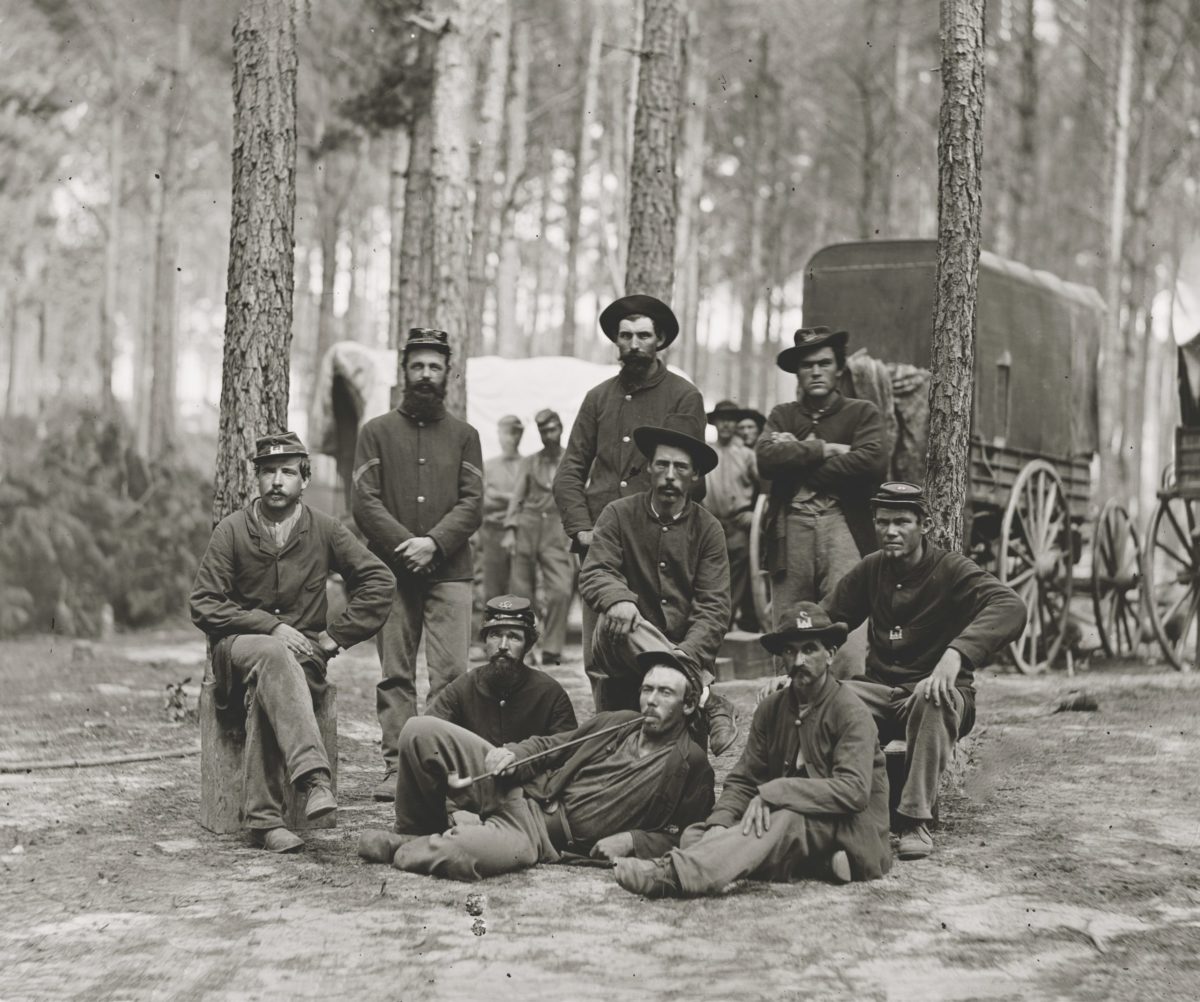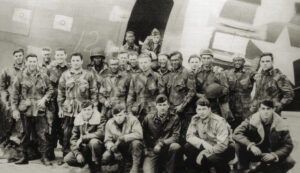Union Engineer Gilbert Thompson documented his service with an illustrated diary
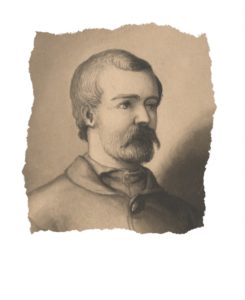
Gilbert Thompson was an exceptional young man. Raised in the experimental, reformist community of Hopedale, Mass., he received a thorough education that included at least some artistic instruction. It was likely his skill at drawing that prompted him to join a planned company of topographical engineers in November 1861 when he was 21. Because of poor recruitment results, though, that company was never fully organized, and Thompson and fellow recruits were transferred to Company B of the U.S. Army Corps of Engineers, which later became part of the U.S. Engineer Battalion that served with the Army of the Potomac throughout the war.
Thompson kept at his artwork during his service and used it to illustrate written journals of his wartime experience. About 15 years after the conflict, he went back to his journal and added material, producing a hybrid of wartime writings and recollections, though it is possible to differentiate the eras from another. Some of Thompson’s wartime entries and sketches, many produced during the Army of the Potomac’s camp at Brandy Station, Va., in the winter of 1863-64, are presented here. Spelling has been left as found, and brackets have been inserted around material added for clarity.
Nov. 1861.
Thurs. 21.
Too-morrow morning I am for Boston, thence to Fort Warren [corrected to “Fort Independence”] as a soldier. I was down yesterday and was examined. I am to go in the Topographical Engineers (Co. A).
Nov. 22. 1861.
Off to the wars with other intelligent men. I have joined the Topographical Engineers (Co. A) sworn in today, A fine day in prospect; Hopedale never seemed so gay as last night. Two weddings and light and mirth, music and song….Though I am going away to encounter I know not what, yet I feel a buoyancy, an exulting spirit; whether I am possessed or not I am happy.
Fort Independence, Boston Harbor.
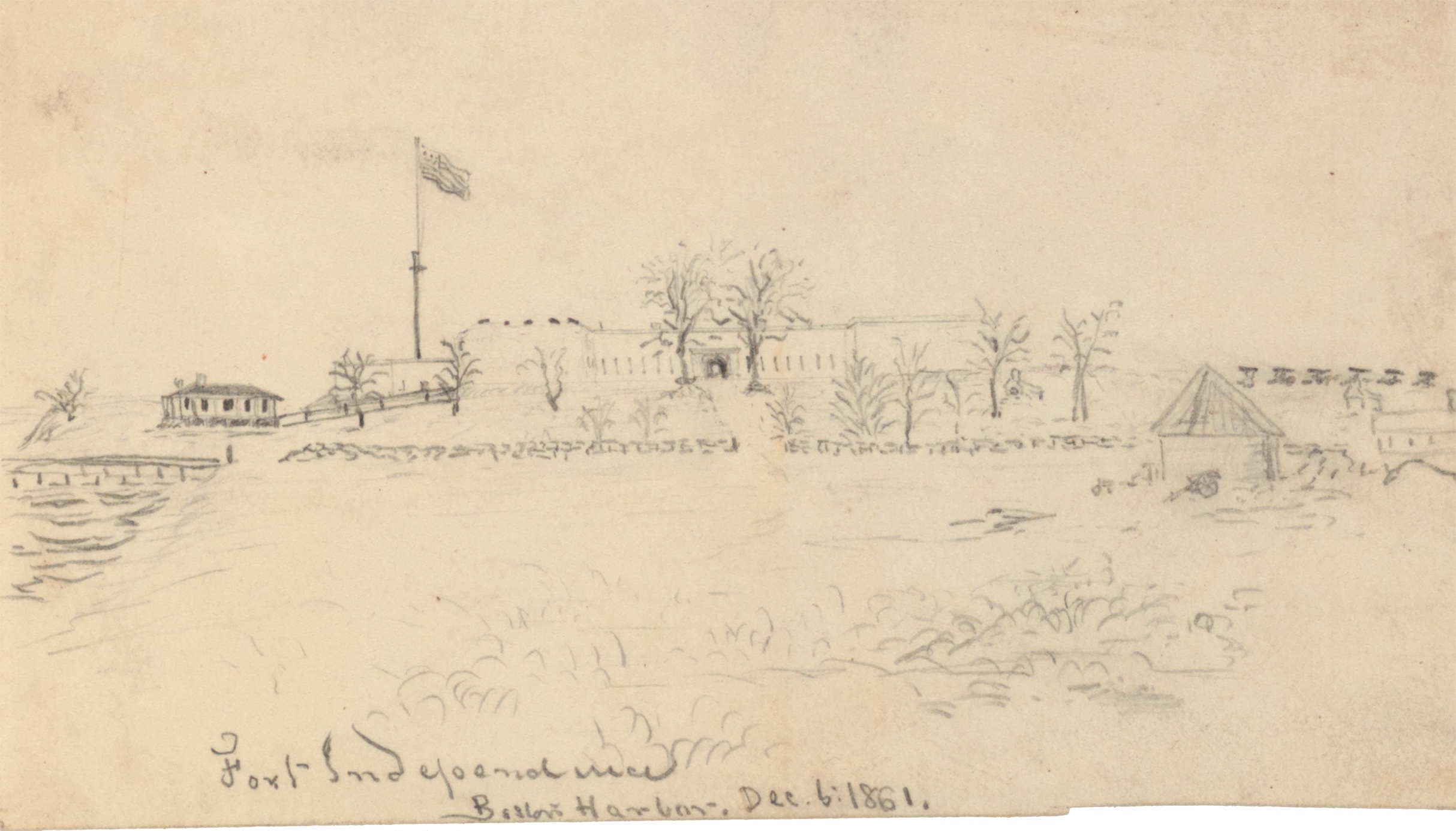
Dec. 1861.
Sun. 29th
On the opposite side of the table (pine table) from me is a pleasant-looking young man, a tailor by trade, putting a pocket into a great-coat, others are reading Dickens Dave. Copperfield in nos. and if my chirography is this and that way, it must be attributed to keeping time with the foot to a lively tune our drill-corporal is playing on the accordion accompanied by another with bones that a few days ago probably graced a soup dish. A couple of Maine boys are gazing into the bright coal fire, thinking perhaps of bright fires at home, while others are sitting in the bunks looking on at the various attractions of this room. Altogether, friend Jour[nal]. it is a queer scene for you, and did you ever think the boy who used to bend over the preceding pages, writing of this and of that, should ever write a page or two in a plain old room on Castle I[slan]d. [on] the sunny side of Fort Independence, Boston Harbor? Eh!
Soldier’s life here at present, or rather what it was, is as easy as possible. Our only duties are cooking, policing and three hours drill a day. Sunday morning at 11 o’cl’k we have Inspection, and in the afternoon, at least today, instead of attending service in Hopedale Chapel, we stood three-quarters of an hour or so hearing the very agreable Articles of War.
There are at present 13 of us, and we have (only) notice of leaving here soon, perhaps too-morrow, for West Point, what we are to do, we can only surmise, but hope for the best, and are determined to be cheerful under whatever circumstances may be granted to our term of enlistment.
Camp near Falmouth, Va.
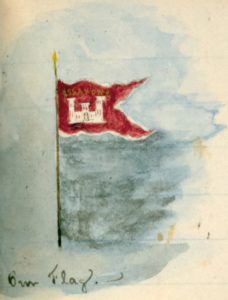
April, 10th, 1863.
Friday.
Delightful. Wind S.W. Yesterday was pleasant though cool, wind N.W. roaring round to S.W. at noon to-day. I think we will have a storm, as it is hazy to-night with light fleecy clouds. Came off Guard to-night at Retreat; and if there is any military duty I hate, it is this. I had rather walk post [at] night along thick and thin than be 1st Corp[ora]l of the Guard. I actually dread it. We had Inspection and Muster to-day to find the actual number of men, &c. The Battalion made a fine appearance. The note-worthy incident of the day is the receiving of our color—a fine silk Regular Flag. Co. D doing escort duty to the color-guard. Serg’t [Barnard] Carney [of Company A], color serg’t. Long may it wave.
Washington,
Feb. 6th 1862
Thurs.
Had some pleasant days, but to-day is dull again.
Received some letters from home, all in one, good, good. I could have one a day and not be tired of them. Mother is getting along nicely. We have been going through the Bayonet Drill a little, but will see more of it. The besetting sin of a soldier in quarters is one I hardly thought of contending against, viz, Idleness. We have actually got Lazy, we growl at even a drill-call, complain at even five minutes duty, this will wear off, by & bye, I guess. The sight of those huge Pontoon Bridge boats over on the Parade Ground, make my shoulders acke in sorrowful prospective. [Atkins] Higgins and I have copartively bought a spider, much to the envy of all around, and we talk grandiloquently about “Our Spider!” I have a little bottle of Syrup, which puts a good edge to the bread, and once and awhile I purchase a quantity of milk (1 ct’s worth, Marm) of an old lady who comes to Our Pizarro, mornings, sir! which makes real coffee out of our stuff, sir!
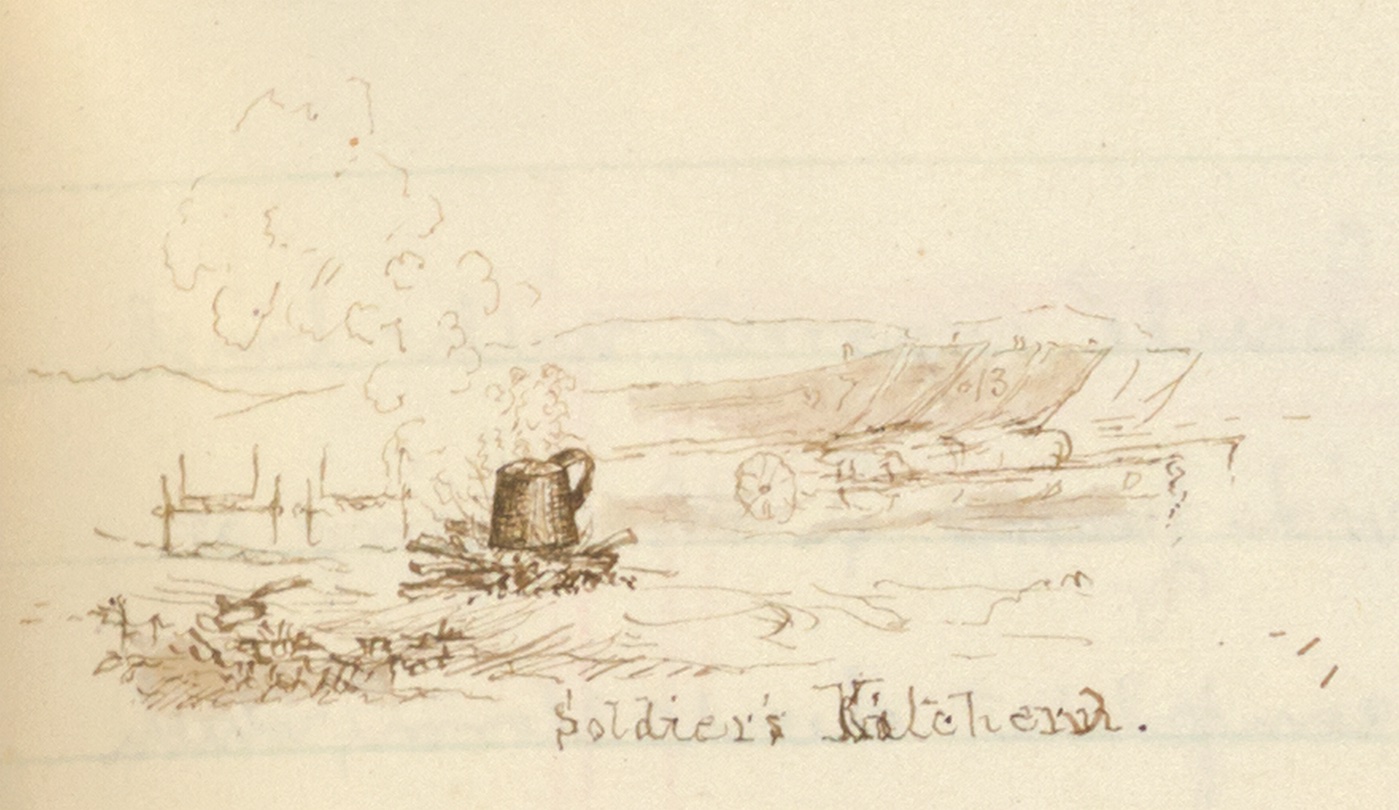
Brandy Sta[tion]. Va.
Dec. 14th, ’63.
Monday.
Pleasant in forenoon, W[in]d. S.W. with a little hurricane in p.m. and blowing to-night briskly from N.W. probably be cold too-morrow. Wrote to mother to-day. All hands for a little change were va[c]cinated; amused myself sketching designs in Jour., like to have had an acke in stomach from eating too many beans, reason why, “bunky,” don’t eat em. Hope we move or do something. Lt. [George L.] Gillespie and [Private] Johnny Carr at Knoxville, Ten.
Camp at Brandy Sta. Va.
Jan’y. 14th, ’64.
Thurs.
Cloudy, and warmer. Puttered round kitchen to-day, dived into Arithmetics, went to Fractions, that is my “start” too-morrow. Had roast duck for dinner, letter from mother to-night, surely I ought to be a happy mortal.
Jan. 15th. 1864.
Dived into Fractions and built a little bridge across brook for recreation, threatened to use [William] Shibley’s Bootees for Pontons. (14th) Felt a little qualmish about the stomach in afternoon; been eating too many nice things contained in box lately received [from home].
Jan. 16th, ’64.
Pleasant; engaged in a little civil engineering—making sink [a latrine]. Puzzled over Fractions; it is astonishing how poorly mathematical works are written; I wonder that children do as well; the why is neglected entirely. Went in to [John] Bishop’s, had a pleasant chat, went to [Alonzo] Rice’s to hear some music; all so-so.
Brandy Sta. Va.
Dec. 25th, 63.
Friday.
Pleasant and Christmas! Oh! what memories of good times come teeming in upon my thoughts. Home and Christmas are almost one to me; today years ago, was the inauguration [of] the culminating effect and result of all the rehearsals, in aid, trimming with evergreen the old chapel at home; how young declaimers said their “You’d scarce expect &c.” mingled with the exercises of those of maturer growth; here to-day—while those at home are enjoying all this, I with others labored on our new quarters, and after “Taps” bunky and I will make a milk (Condensed) punch of our whiskey ration and drink to “Auld Lang Syne,” he leaves me too-morrow [Thompson’s bunkmate, Ned Coolidge, had been busted from corporal to private and could no longer share a tent with the other non-commissioned officers]….
Brandy Sta. Va.
Dec. 29th, ’63,
Tuesday.
Stormy last two days; cleared away to-day. Quite a little thaw occurred of course, and our Company Parade glories in as much mud as ever at Falmouth. To-day moved into new house; built according “to Order,” four in each hut, two bunks &c., all alike and regularly laid out; “Ours”—how often this “Ours” has occurred in my Jour. and different ones it includes and means—“Ours” having a good drawing fire-place, a good blessing; two bunks, one above the other; the hut being built of logs, about 5’ high 11’ l’g inside, 7’ wide; our floor is mud mud—but I and “bunky”—a new one, [Joseph] Cummings—Ned and I broke up house-keeping to-day, this “bunky & I” means some one else. I am decently satisfied. The “renowned four” are [Shibley], Thompson, Cummins, [and Decatur] Blake—now come on old muddy Winter. A Virginia artist should by experience and knowledge represent Winter covered with mud, his locks dripping with chilly dampness rather than icicles and frosty breath.
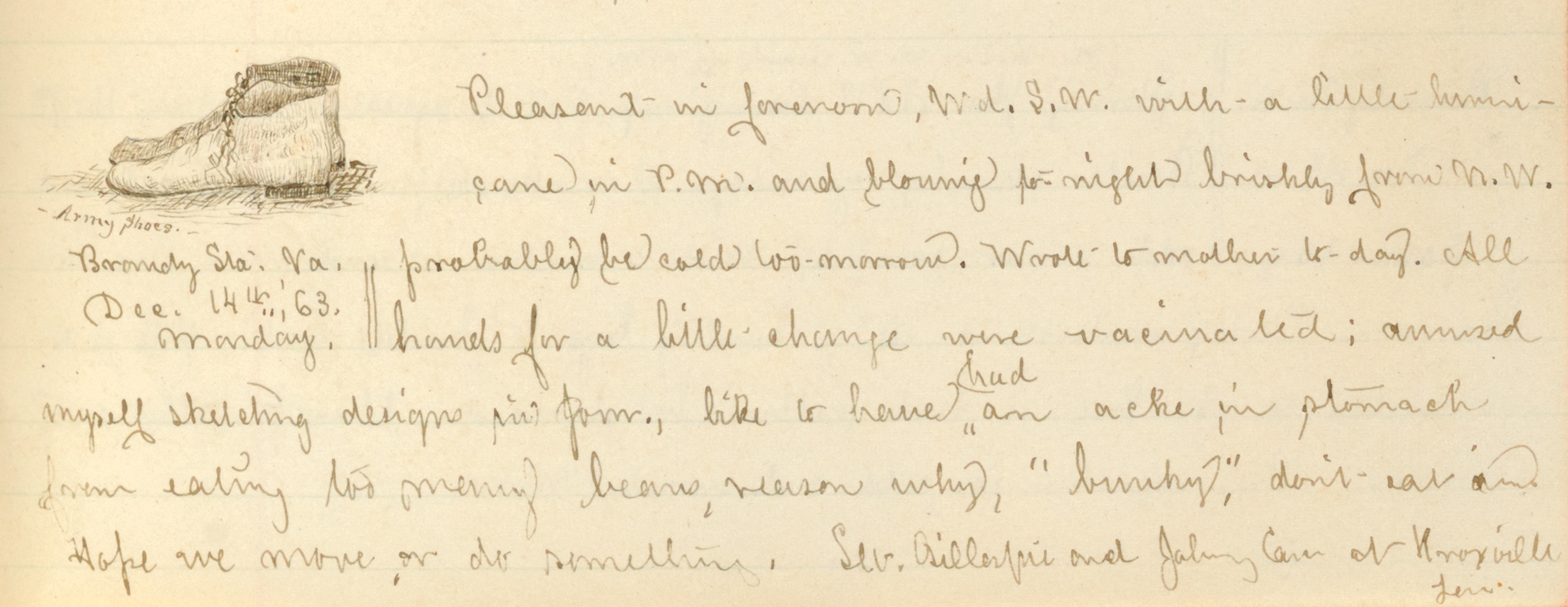
Brandy Sta. Va.
Jan’y 5th, 64.
Tuesday.
Pleasant. In woods to-day; had a grand theological pow-wow after supper which has all subsided, and all are writing but Blake who is enjoying a quiet smoke by the fire. There was something in the wind last night, as our teams were drawing rations at the depot as well as the 6th Corps. [Confederate Lieutenant General Richard S.] Ewell is up the valley I understand; perhaps a reconaisance in force was in view. Anyway a tramp just now would be a little disagreable, especially as our quarters are quite comfortable. The Company Parades are being graded, kitchens constructed, &c., and the regularity of the huts give a substantial character to the camp. Express boxes came, more next time.
Brandy Sta. Va.
Jany 12, ’64.
Tuesday.
Somewhat cloudy. Thatched Kitchen to-day. Our winter-quarters are yet uncompleted entirely. The Officers’ houses yet unfinished, as usual all this is quite interesting to me, as I learn much that is practical. The lack of certain kinds of material and the availability of [others] renders necessary such modus operandi as find their prototypes in the days of the colonists and pioneers. Our huts are of uniform style covered with two Shelters, but the cook Houses differ, B has roof of oak shingles, calling in play the skill of a pioneer, to cut and rive them, C has one that reminds you of old times with pine worked into the form of tiles; ours [Company D’s] smacks of Ireland being pine-bough thatch laid on “mud,” solid and rain-proof too; and the camp while in the elevated position “Charge de Affairs” on our cook-pot appeared like some mimic town in regularity, only missing the gay equipages of fashion and the places of commerce.
Camp n’r Brandy Sta. V[a].
Jan’y 20th, 1864
Wednesday.
Pleasant to-day. The 18 & 19th stormy and chilly. On G’d [Guard] 19th, Miserable time; rec’d Photographs, sold all, am quite successful in this spec[ulation]. of mine. Gave the huts a little fixing up, covering the logs with paper and the door with canvas; making a cupboard out of my Express Box, its door rejoicing in the ornament of a quite fine picture “Under the Flag,” from Harper’s Weekly; an old man with a wee darling holding a U.S. Flag over his head, it is an English picture changed, being originally “Under the Mistletoe.”
Jany 22nd, ’64.
Usual weather, warmer. Washed, fried some chef-de-overs of buckwheats; rec’d a letter from mother, all well. I have tacked papers over the logs, giving the room quite a cheerful aspect, and when eating I entertain the mind by reading from them, and it would not be a terrible stretch of the imagination to consider myself the host of all the literary characters that ever flourished….
Jan’y 28th, 1864.
. . . .
Have made a couple of sketches, “Our Alley,” “Our Tent.” Capt. [George H.] Mendell [the battalion commander] wishing me to make a sketch of the camp. Have a diagram to draw for Capt. [Charles N.] Turnbull [commanding Company D of the battalion].
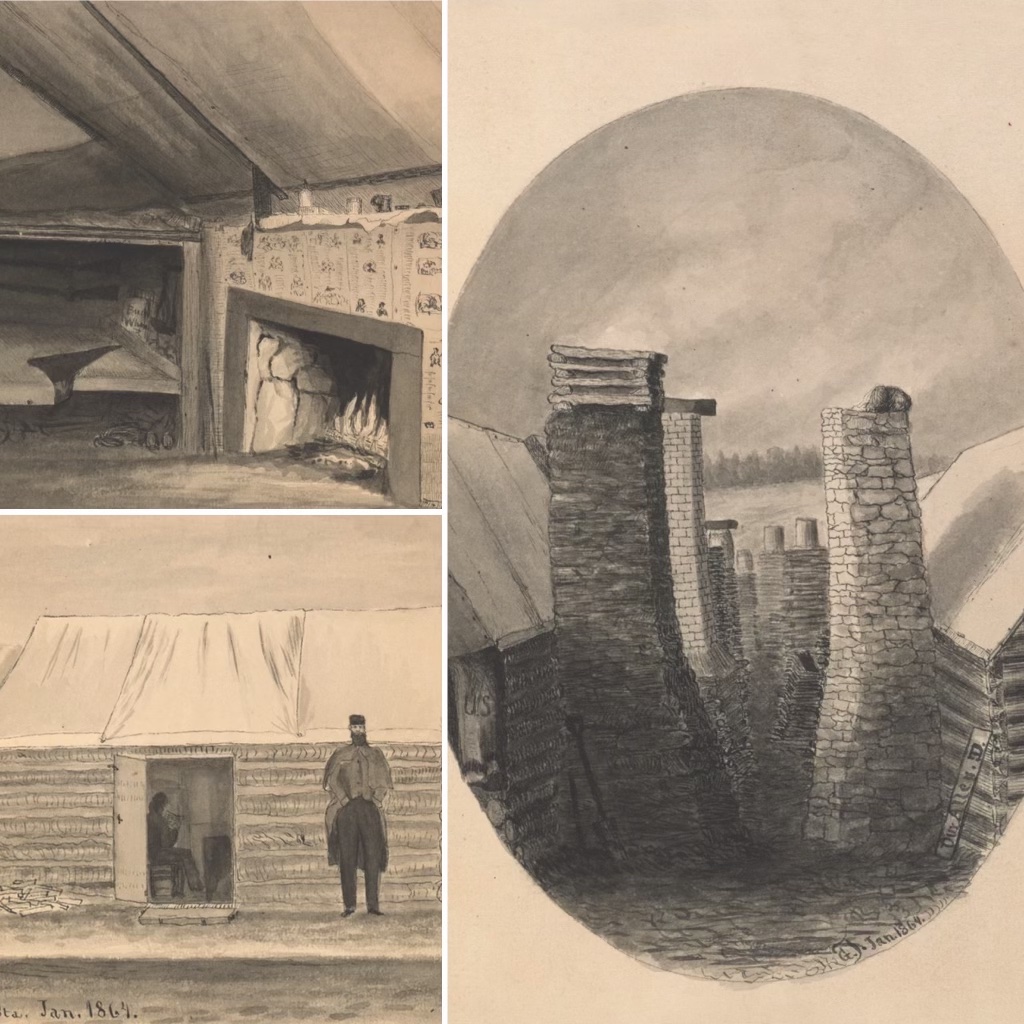
Camp at Brandy Sta. Va.
Feb. 1st, ’64.
Monday.
Clearing away. Puttered on a picture of Interior of hut, half done. Am lonesome to-night. “Shib” [Corporal William Shibley] kept us interested until 12 last night, telling about the Indians on the Plains, very amusing. He has gone to Catlet’s [Station] to work on Stockade, such as I drew. Read [Walter] Scotts “The Lady of the Lake,” just been narrating its plot to Blake & Cumming’s. Am going to read some good letters I have saved up for such occasions, full of genial cheerfulness.
Jan’y 28th, 1864.
Very Pleasant indeed the last few days. I cannot realize that it is January. Some thirty of us have organized a Dramatic Club, Capt. Mendell encouraging; We’ll see. I am of the Orchestra [Thompson had procured a cello]. Rec’d letters from M. A. Blunt [his former employer], and mother. The former telling me the agreable fact that an old friend of mine [is now married]….
Jan’y 29th, 64
Cooler, and foggy, prospect of rain. Out in woods cutting corduroy for the Theatre. All progressing finely; Yesterday made some diagrams for Capt. Turnbull, of a blockhouse, having Sibley Tents on each angle on stockade, serving for a living-place and flankers.
Feb’y 9th, ’64.
Tuesday.
Pleasant, copied a few tit-bits of heads, I am an artist by nature, I believe. Helped raise rafters to theatre in afternoon. Dress Parade. This page is graced by a laurel flower from Occoquan, one of the lovely places of Virginia [editor’s note: an impression remains on the original page of this entry where Thompson had saved a laurel flower]. A Mass[achusetts]. band played while we were laying the bridge, and never had Music a more fitting Amphitheatre, it sounding magnificently.
The Blue Ridge has a fine and interesting appearance just at present being covered with snow, thus showing them more distinctly, and in a practical point of view being a good study for an artist. Were it not for their range of mountains, the scenery would be very tame indeed. I heard a negro say “he’d gathered corn on [one] side of the mountains and snow on the other.”
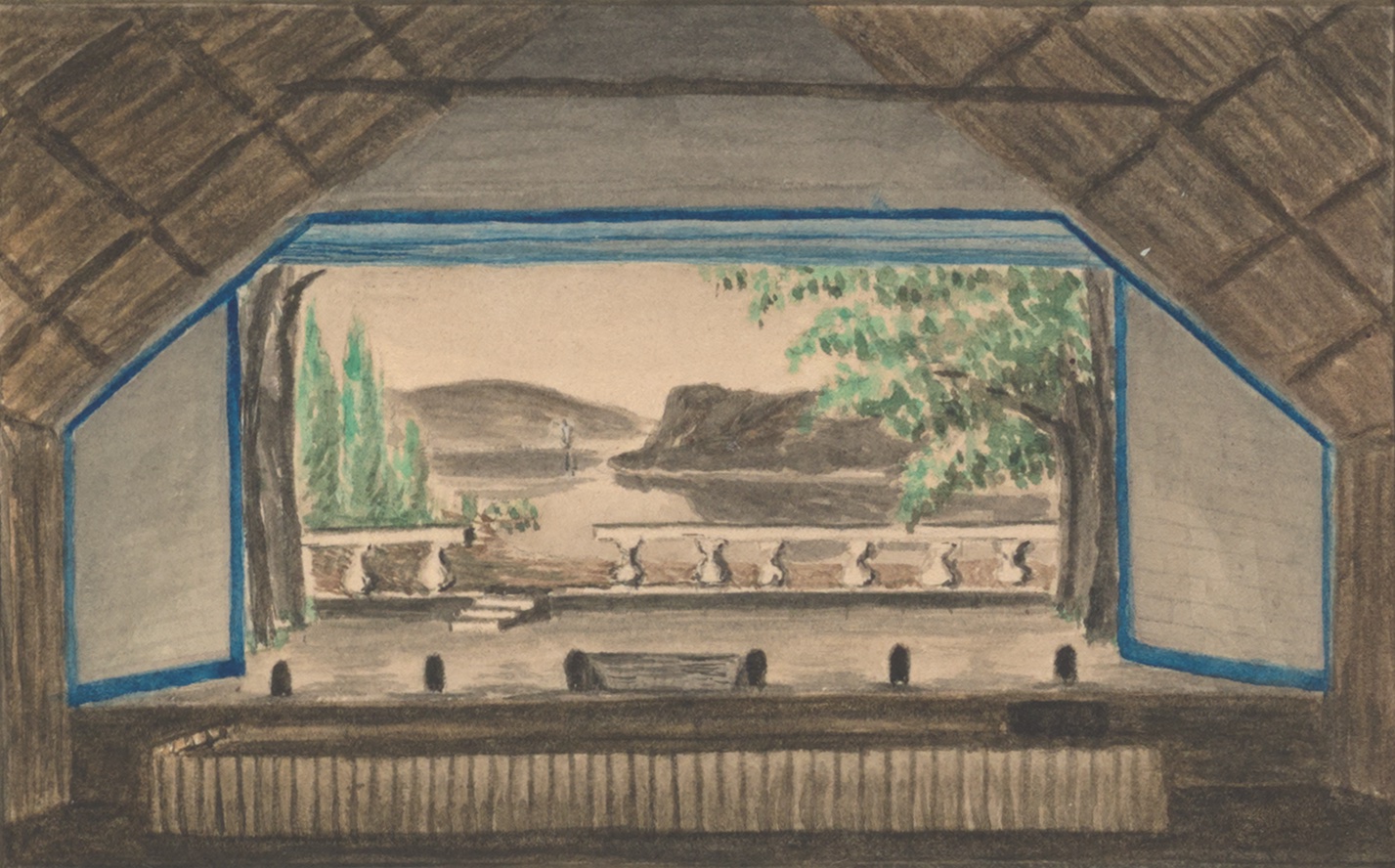
Brandy Sta. Va.
Feb’y 16th, ’64.
Tues.
Blowing like a pack of wolves. On G[uar]d yesterday. Painted a scene for our Theatre,—largest sized work of art I ever was engaged upon. Received box from home, rather in poor shape, they open things shamefully at Provo[st]’ H’d Quar[ter]s., though mine was probably done on the road. Worst of all an old pitcher which mother had put some pudding in was broken, I am sorry as it was a favorite one of mine; I have a great way of thinking much of such familiar objects from association alone; why, I wouldn’t take a mine for my little watch, that has done so well since leaving home, and I hope sometime to hear it ticking as of old over the old cat bed at home.
Brandy Sta. Va.
Feb’y 21st, 64.
Sunday.
Pleasant; Inspection; Sunday Service. All so-so. Since last date, one evening in our Theatre, a Mr. Rockwell lectured on “There and There in Europe,” it was quite good, but the best of it all was that it seemed like times at home, and I really felt quite a self-gratification, it was our work and something that is a credit to the Battal’n. The stage appeared quite neatly and pretty, my landscape scene standing out finely,—stage scenery is very simple, if one knows how. The boy’s are rehearsing [The] Toodles, which will go pretty well I guess. It made me think of old times.
Brandy Sta. Va.
Feb’y 25th, ’64.
Thurs.
. . . .
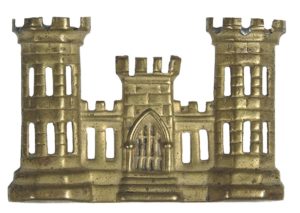
The evening of the 22d we had an impromptu “gander dance,” at the Theatre. I acted as sort of Manager. We had Cotillions, S[c]hottisches, Polkas, Waltzes. It was a success, all having a grand good time, Capt. Mendell kindly postponing Tattoo. No Salutes were heard. The Theatre is now completed, and too-morrow evening, [The] Toodles will be produced, &c. I am only scenic artist. My Violincello not yet arriving; a number of musicians are expected from elsewhere. Rec’d letters from mother and M. A. Blunt, my old boss. I sent my watch away to be cleaned. We are Studying Tactics, with Company Drill. On G’d.
Brandy Sta. Va.
Feb’y 26th, ’64.
Friday.
The event of the day is the opening of the Theatre, &c. [The] Toodles being produced, with songs, &c. The Officers were all in, and also some ladies. All went off well. The scenery looking well. This is a little different from last winter; and it is indeed a credit to the Batt’ln. All being quite well pleased.
Brandy Sta. Va.
Feb’y 27th, 64.
Sat.day.
Pleasant. Paid to-day. The Performance of last evening gave good satisfaction; all I cared was the scenery appeared well. Had a dance at Theatre.
March 3rd, ’64.
Thursday.
Pleasant. Co. Drill. Theatre Night last evening, very good, “Box & Cox,” “Will[iam]. Tell.” “Toodles.”
Brandy Sta. Va.
March 16th, 64.
Wednes.
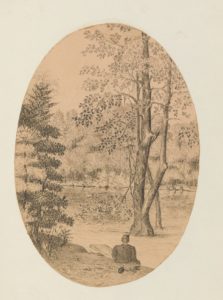
Quite cool this morning. Last evening we had “Irish Assurance” at the Theatre. Everything went in a quiet, pleasant manner; the reason of it being the exclusion of the quartermaster’s men (citizens) except those with Passes. It seemed like some family gathered together, charitable towards error, and warmly praising success. The music was better than before, but I shall veto Fritz Vogel’s Flute, he plays horrible, spoiling the rest. My part is liked very well, in fact, I “played all the music,” but Jake does very well, Rice is coming back with his flute, then I shall be relieved of Directorship, and be only Assistant. I am writing my Play, “Bag of Gold,” not thinking of having it acted here but to amuse myself.
Brandy Sta. Va.
April 3d, ’64.
Sunday.
Quite pleasant to-day. Inspection in morning, [religious] service at Theatre as usual. Arranged some music, that’s all.
Wood’s Farm.
Friday.
June 10th, ’64. (7 p.m.)
Pleasant; nice little breeze. Been engaged in the very agreable process of rejuvenation. Our late diet of pork for a few days is a little unsettling; and will continue; I hope we will have fresh beef and especially if we can cook it ourselves, take it right along. I had rather cook for myself, so had the rest. No news, as usual at the front, as far as I know. I hear less picket firing: understand the R.R. is being destroyed—which is an odd way of keeping a base of supplies in order. I guess a great deal but know nothing. Amused myself working up the “View on the Pamunkey,” will make a neat picture.
The 7th while surveying I was bullet-bound in one rifle-pit, over whose crest I was obliged to go to get into another I wished, so I resigned myself and found a good seat and watched affairs about me, and the birds interested me as much as anything, they commencing to sing in a wild and unnatural, yet gleeful way as the bullets embedded themselves in the trees or cut with a sharp spat the leaves near them; as though experiencing the same feeling as humans under fire, neither wanting to stand[,] lay down or move away, laughing in a queer way as the missiles flew past….
Mark A. Smith, a professor of history at Fort Valley State University, recently published A Volunteer in the Regulars: The Civil War Journal and Memoir of Gilbert Thompson, US Engineer Battalion. He is also the author of Engineering Security: The Corps of Engineers and Third System Defense Policy, 1815-1861. Corporal Gilbert Thompson’s full journal is held at the Library of Congress (https://www.loc.gov/item/mm81095752/).

